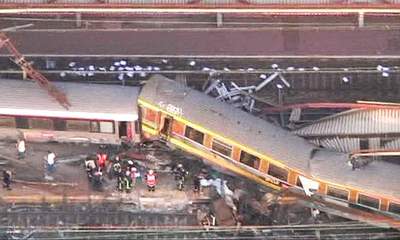Paris Train Crash: Faulty Track Likely Cause

A loose steel plate at a junction may have caused the derailment of a packed train outside Paris that left at least six people dead and dozens injured.
Pierre Izard, a general manager of the SNCF national rail company, said the steel plate, which should have remained bolted onto the track, moved to "the middle of the track junction".
The detached joint "prevented the normal progression of the train's wheels and seems to have caused the train's derailment," he said.
Checks have been ordered on some 5,000 similar devices on the network, he added.
The head of the SNCF, Guillaume Pepy, said "the reason why this fishplate dislocated itself is the very focus of the investigation."
He said the third and fourth carriages initially came off the track, then knocked the others off. He called the accident a "catastrophe", adding that "some cars simply derailed, others are leaning, others fell over".
Earlier, transport minister Frederic Cuvillier had said that human error was unlikely to have caused the tragedy, and that authorities were looking into a possible mechanical error in the switching system as well as other possibilities.
The crash was France's deadliest in years, but Mr Cuvillier said it could have been worse and praised the driver who sent out an alert quickly, preventing a pile up.
Responding to criticism that France had not invested enough in maintaining infrastructure, he added: "For the moment we have no information that allows us to confirm that the dilapidation of the network was the cause of this derailment."
The seven-carriage service with 385 passengers on board was about 20 minutes into a three-hour journey to Limoges when it crashed 12 miles south of the capital at about 5.15pm local time on Friday.
Part of the metal roof over the platform was crushed as carriages came off the tracks and smashed into Bretigny-sur-Orge station.
Interior minister Manuel Valls said at least six people had been killed. He added that nine people were gravely injured, and warned the number of dead could rise. In all, nearly 200 people were hurt.
A large, heavyweight crane is expected to be brought in later to try to lift one of the carriages which toppled over.
Sky's Ian Woods, who was at the scene, said: "They don't know for certain, but there may well still be people underneath that carriage they haven't been able to get to.
"It's unclear whether anyone at the station was hurt by the impact of the train and flying debris, or whether all of those injured were on the train."
Footage from the scene showed crushed metal on the platform and debris from the crash clogging up the stairs.
Emergency services went on red alert with 300 firefighters, 20 paramedic teams and eight helicopters deployed to the area.
All Paris regional hospitals were put on standby to deal with casualties.
Within hours French President Francois Hollande was at the scene and said: "I want to express our solidarity to all the families.
"It will take a long time to identify the victims. Investigations are under way and as soon as possible we will name them and inform their families - I understand their anxiety and pain."
Briton Graham Hope, a passenger in the third carriage, told Sky News: "The carriage I was in was bouncing for several seconds before we came to a halt.
"Everyone was very calm. A couple of people were quite concerned, but we worked together to get out of the carriage.
"When I got out we could see the rest of the train was further up the line ... I would be very surprised if people got out of the front carriage unscathed."
A witness in a nearby train, 19-year-old Bazgua El Mehdi told Le Parisien newspaper: "I heard a loud noise. A cloud of sand covered everything. Then the dust dissipated.
"I thought it was a freight train, but then we saw the first casualties ... many passengers on the (train) were crying."
A police source said: "The train arrived at the station at high speed. It split in two for an unknown reason. Part of the train continued to roll while the other was left on its side on the platform."
But a passenger speaking on France's BFM television said the train was going at a normal speed and was not meant to stop at Bretigny-sur-Orge.
The station is expected to remain closed for several days during the investigation and clear-up operation.
The crash occurred as France prepares to celebrate its most important national holiday, Bastille Day, on Sunday.
Many people have been heading out of Paris and other big cities to see their families or to go on holiday.
Earlier, passengers observed a minute's silence at Austerlitz railway station in Paris as a mark of respect.

 Yahoo News
Yahoo News 